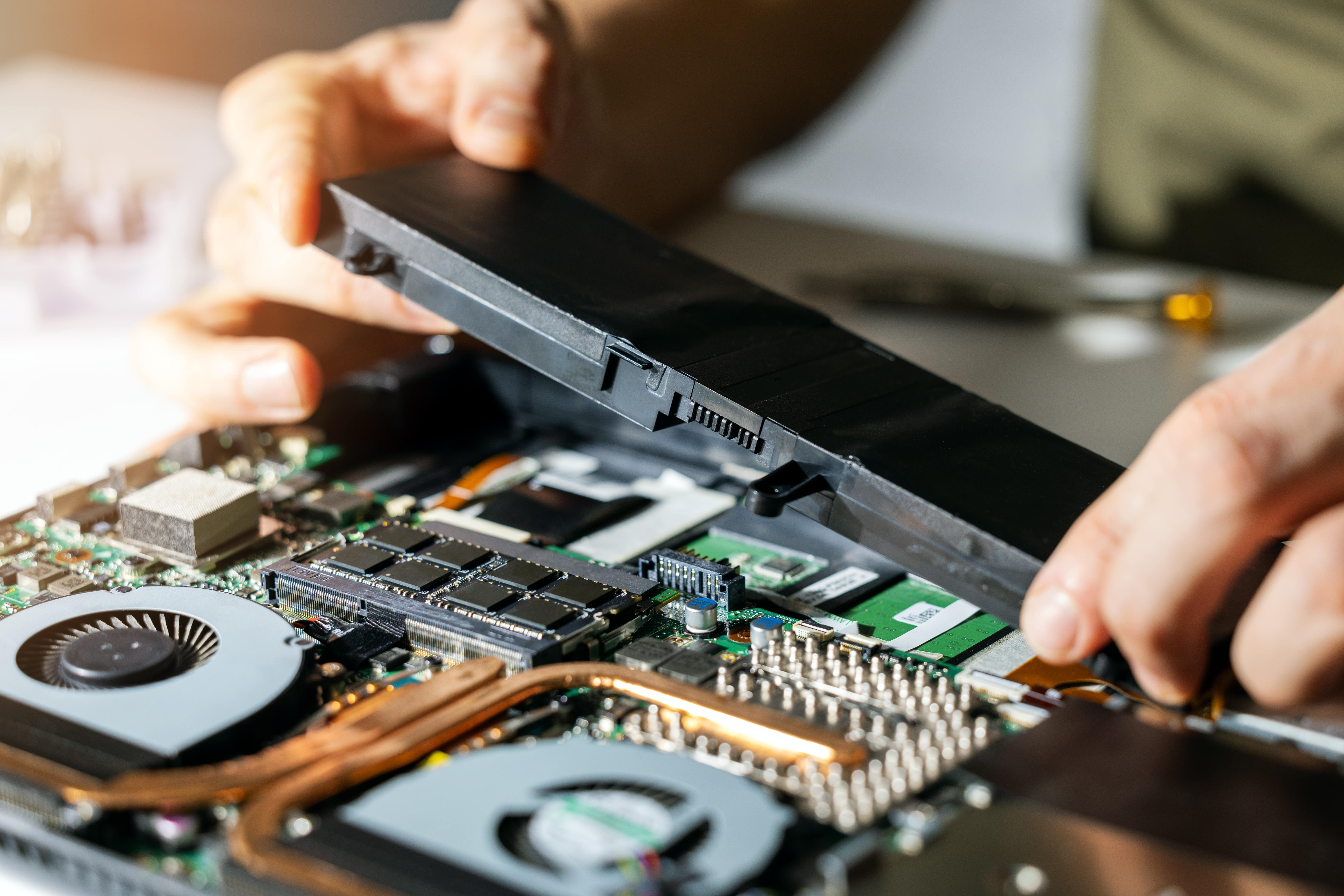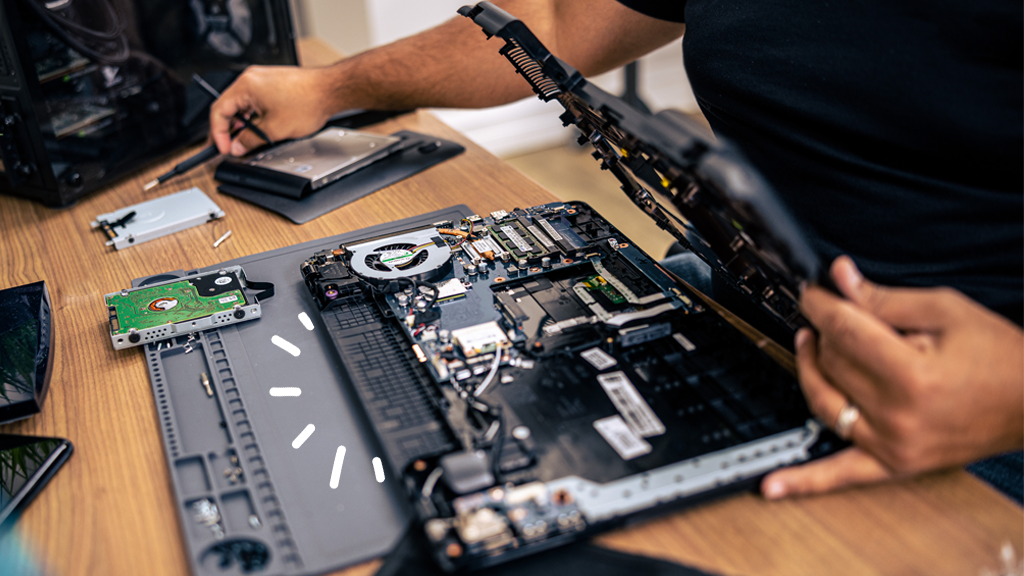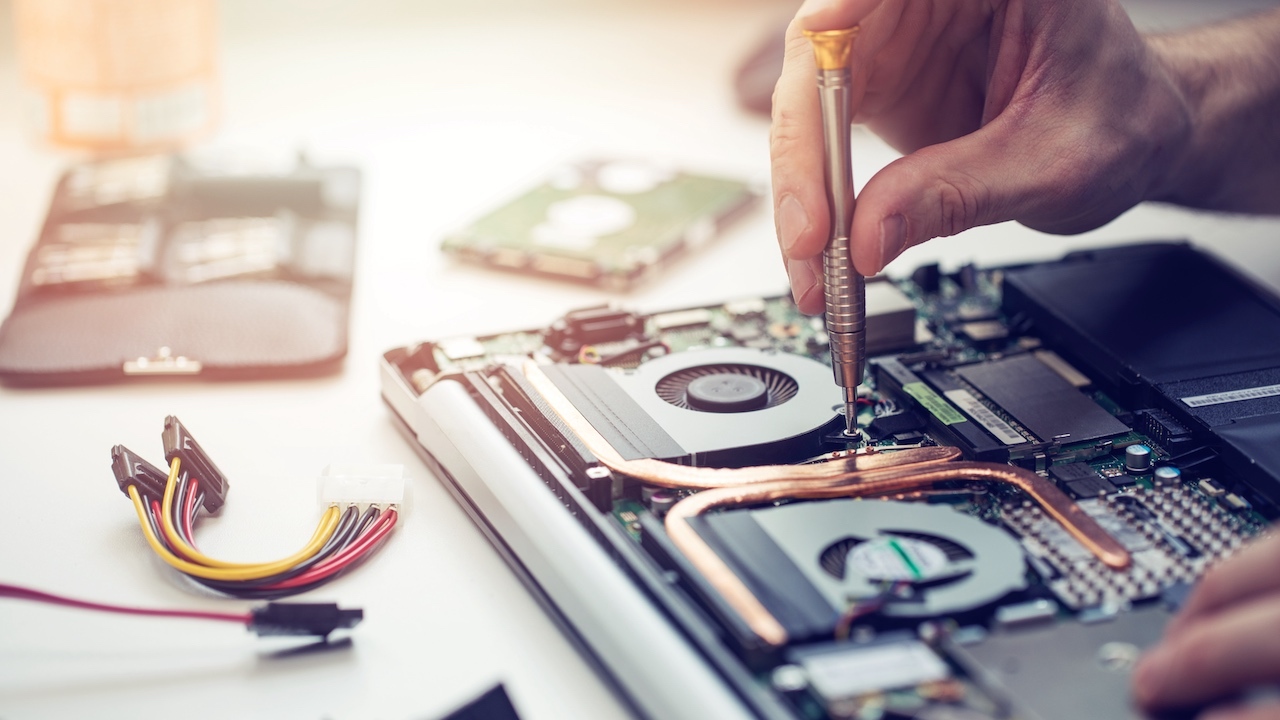Laptop Maintenance - Ensuring Optimal Performance Through Best Tips
Elevate laptop performance with expert laptop maintenance tips. From cleaning to software optimization, ensure longevity and optimal functionality.
Author:Darren McphersonReviewer:Gordon DickersonDec 22, 20234.7K Shares157.1K Views

In the fast-paced digital era, laptops have become indispensable tools for work, education, and entertainment. To ensure that your laptop continues to function at its best, regular laptop maintenanceis essential. This comprehensive guide covers various aspects of laptop maintenance, from physical care to software optimization.
Our lives now would not be the same without our laptops, which are not inexpensive. Thus, you should purchase a laptop with a longer lifespan. Like any other electronic device, a laptop can last a long time with proper care and routine maintenance.
Do you not know how to take care of your laptop? Here are some laptop maintenance suggestions to help you get more use out of your device:
Physical Cleaning And Care For Laptops
Laptops have become integral to our daily lives, serving as indispensable tools for work, education, and entertainment. To ensure their optimal functionality and longevity, regular physical cleaning and care are essential.
Begin the physical cleaning process by turning off your laptop and unplugging it from any power source. This ensures safety during the cleaning procedure.
Use a soft, lint-free cloth to gently wipe away dust, fingerprints, and smudges from the laptop's external surfaces. This initial step not only enhances the laptop's appearance but also prevents dirt buildup that could potentially affect performance.
The keyboard and touchpad are among the most frequently used components of a laptop and, consequently, are prone to accumulating dust and debris. To clean the keyboard, turn the laptop upside down and gently shake it to dislodge any loose particles.
Next, use a can of compressed air to blow out dust and crumbs from between the keys. A small, soft brush can also be effective in reaching tight spaces.
For a more thorough cleaning, you can dampen a lint-free cloth with a mixture of water and isopropyl alcohol. Wipe down the keys and touchpad, ensuring the cloth is not excessively wet to prevent liquid from seeping into the laptop.
A laptop's screen is its window to the digital world, and keeping it clean is crucial for an optimal viewing experience. Use a microfiber cloth to gently wipe away dust and smudges.
If the screen requires more than a dry cloth, you can use a screen cleaning solution. Apply the solution to the cloth rather than directly on the screen to prevent excess liquid from entering the laptop.
Battery Care For Laptops
In the realm of laptop maintenance, proper care for the battery is crucial for ensuring both optimal performance and longevity. The battery is a vital component that powers your laptop on the go, and understanding how to care for it can significantly impact its overall lifespan.
Over time, even the most remarkable laptop battery life may degrade. Optimizing the battery settings is essential for longer battery life.
First and foremost, you should always keep your laptop plugged in for as long as possible. All you have to do is leave the power cord plugged in if you spend most of your time at your desk.
Overcharging the battery on your laptop is not as big of a deal as you might think, despite popular belief. ASUSensures that the power cord will automatically cut off power to your computer when it is fully charged and not start up again.
The operating temperature of your laptop significantly impacts the health of its battery. Batteries degrade faster when exposed to high temperatures. To ensure optimal battery performance and longevity, it's essential to keep your laptop in a cool environment.
Avoid using your laptop on surfaces that can trap heat, such as soft furnishings, and refrain from leaving it in direct sunlight or in hot cars. Maintaining a cool operating environment is a simple yet effective strategy for preserving your laptop battery.
Regularly calibrating your laptop battery is an essential practice to ensure accurate reporting of battery life. Calibration involves allowing the battery to discharge fully and then recharging it to 100%.
The calibration process helps synchronize the battery's internal circuitry with the operating system's battery monitor, providing more accurate readings of the remaining battery life. This, in turn, enhances your ability to gauge how much charge is truly available.
Most laptops come equipped with power management settings and battery-saving modes. These features optimize system performance for longer battery life. When using your laptop on battery power, consider activating these modes to conserve energy.
Low-quality or generic chargers may not deliver a consistent and stable charge, potentially leading to issues such as overcharging or insufficient charging. Investing in a quality charger is a small but wise investment in the long-term health of your laptop battery.
Operating system updates often include improvements in power management and battery optimization. Keeping your operating system up to date ensures that your laptop benefits from the latest enhancements designed to maximize battery efficiency.
Configure your system to receive automatic updates or regularly check for updates manually to stay current with the latest improvements in battery management.
Laptop Maintenance Software Optimization
In the realm of laptop maintenance, addressing the software aspects of your device is as crucial as caring for its physical components. Software optimization and storage management play pivotal roles in enhancing your laptop's performance, responsiveness, and overall efficiency.
Regularly updating your laptop's operating system is fundamental to software optimization. Operating system updates, often released by manufacturers like Microsoft, Apple, or Linux distributions, encompass crucial improvements in security, bug fixes, and enhancements in overall system performance.
Configure your laptop to receive automatic updates to ensure you're always running the latest version. Staying current with updates not only fortifies your laptop against security vulnerabilities but also introduces features designed to optimize its performance.
Protecting your laptop from malicious software is paramount for its optimal functioning. Install a reputable antivirus program and conduct regular scans to detect and eliminate potential threats. Malware, including viruses, spyware, and ransomware, can compromise your laptop's performance and pose a significant risk to your data.
Schedule automatic scans for convenience, and update your antivirus definitions regularly to stay protected against emerging threats.
Over time, your laptop's storage can become cluttered with unnecessary files and fragmented data. Disk cleanup and defragmentation are two key processes that contribute to storage optimization.
Storage Management
Effective storage management is vital for maintaining a responsive and organized laptop. Implementing sound storage practices helps prevent storage bottlenecks and ensures your laptop operates at peak efficiency.
Begin by regularly reviewing your storage space. Identify and delete unnecessary files, old downloads, and temporary data. This not only frees up space but also streamlines file access and retrieval.
Utilize the organizational features provided by your operating system. Create folders and categorize files appropriately to facilitate easy navigation and retrieval. Well-organized storage contributes to a more efficient and enjoyable computing experience.
Data loss can be a significant setback, and incorporating regular backups into your storage management routine is a proactive measure to safeguard against it. Schedule backups of critical data, documents, and files to external hard drives, cloud storage, or dedicated backup solutions.
In the event of hardware failure or unforeseen circumstances, having recent backups ensures you can quickly recover your essential data without major disruptions.
If your laptop is equipped with an SSD, specific maintenance practices can optimize its performance. Unlike traditional hard drives, SSDs don't require defragmentation. However, they benefit from having some free space to operate optimally.
Avoid filling your SSD to its maximum capacity. Regularly review and manage your storage to ensure there's sufficient free space, allowing the SSD to maintain peak performance.
Some applications consume more system resources than others, impacting overall performance. Task Manager or Activity Monitor, depending on your operating system, allows you to monitor resource usage.
Identify resource-intensive applications and consider alternatives or optimize their settings to reduce their impact on system performance.
Hardware Checkup
Initiating a hardware checkup begins with a visual inspection for any signs of physical damage. Examine the external components, including the laptop chassis, hinges, ports, and connectors. Look for cracks, dents, or any irregularities that may compromise the structural integrity of your laptop.
Physical damage, if left unattended, can exacerbate over time and lead to more severe issues. Addressing such concerns promptly ensures that your laptop remains functional and resilient.
Most operating systems provide built-in diagnostic tools that enable users to assess the health of their laptop's hardware components. These tools conduct tests on critical elements such as the RAM, hard drive, graphics card, and processor.
Run hardware diagnostic tests periodically to identify any potential issues early on. Timely detection of hardware problems allows for proactive solutions, preventing further damage and maintaining optimal performance.
As technology advances, hardware components within laptops may become outdated. Upgrading certain components can significantly enhance your laptop's performance and extend its lifespan.
Common upgrades include increasing RAM capacity, replacing traditional hard drives with faster solid-state drives (SSDs), or upgrading the graphics card. Before performing upgrades, ensure compatibility with your laptop and follow manufacturer guidelines.
Maintaining Hardware
Stop mishaps before they occur. The hardware on your laptop should generally be protected with caution. Most common pitfalls can be avoided by doing the following:
- Drinks and food should be kept away from laptops. Keep your glass or bottle of water at least one foot away from your laptop when using it for work-related purposes. As a helpful general guideline, make sure your drink is far enough away from your laptop to avoid spills even if you tip it over. Shut the laptop lid if you must eat close to it. Keep the laptop as far away as you can and cover the keyboard with plastic foam to reduce spillage if you do want to watch videos on it while eating (and accept the increased risk to your laptop).
- Utilize your laptop in a safe environment, such as one that isn't near water or extremely hot or cold. Try not to use your laptop, for example, in direct sunlight, next to heating vents, or outside where there's a chance that dust, rain, or other particles could get inside. It's crucial to keep your laptop on a hard surface, check that the vents are clear, and limit how much work you do on it on days when the temperature is high.
- Keep your laptop out of the reach of kids and animals.
Temperature Management
The cooling system plays a crucial role in preventing your laptop from overheating during operation. Conduct a visual inspection of the cooling fan and vents. Dust and debris can accumulate over time, impeding airflow and leading to increased temperatures.
Use compressed air to clean the fan and vents, ensuring that the cooling system functions optimally. Overheating can cause performance degradation and potential damage to internal components.
Over time, the thermal paste that facilitates heat transfer between the laptop's processor and heatsink can degrade. If you're comfortable with hardware maintenance, consider reapplying thermal paste to ensure effective heat dissipation.
If you're not familiar with the internal components of your laptop, seek professional assistance for thermal paste replacement. Maintaining an efficient cooling system is critical for sustained performance.
Traditional hard drives, while functional, can become a bottleneck for overall system performance. Upgrading to a solid-state drive (SSD) can significantly improve your laptop's speed and responsiveness.
SSDs have no moving parts, resulting in faster data access and reduced load times for applications. Additionally, SSDs contribute to improved energy efficiency and temperature management.
For users who engage in resource-intensive tasks such as gaming or video editing, investing in a cooling pad can be beneficial. Cooling pads are designed to enhance airflow and dissipate heat, preventing excessive temperature buildup.
These accessories are particularly useful when using a laptop on surfaces that may obstruct ventilation. Cooling pads come in various designs and sizes, catering to different laptop models and usage scenarios.
The cooling fan is a critical component that helps regulate your laptop's temperature. Over time, dust can accumulate on the fan blades, reducing its efficiency.
Regularly clean the fan using compressed air to remove dust and debris. This simple maintenance task contributes to effective temperature management and ensures that the cooling system operates optimally.
The ambient temperature of the room in which you use your laptop can impact its operating temperature. Avoid using your laptop in excessively hot environments, as this can contribute to elevated internal temperatures.
If possible, use your laptop in air-conditioned or well-ventilated spaces to maintain a conducive operating temperature.
Laptop Maintenance - FAQs
How Often Should I Clean My Laptop?
It's recommended to clean your laptop every few weeks, focusing on external surfaces, the keyboard, and the screen. Ensure your laptop is powered off and unplugged during cleaning.
What Software Tools Can Help Optimize My Laptop's Performance?
Operating system updates, antivirus scans, disk cleanup, and defragmentation are software tools that can optimize your laptop's performance. Regularly updating applications also contributes to better functionality.
Is It Necessary To Defragment A Solid-state Drive (SSD)?
No, SSDs don't require defragmentation. In fact, it's recommended to avoid defragmenting SSDs as it may contribute to unnecessary wear. Focus on regular disk cleanup for SSD maintenance.
How Do I Perform A Backup Of My Laptop Data?
Schedule regular backups using external hard drives, cloud storage, or dedicated backup software. This precaution ensures that your important data is secure in case of hardware failure or other issues.
How Can I Secure My Laptop's Wi-Fi Connection?
Use secure Wi-Fi networks with strong passwords to protect your laptop from potential security threats. Avoid connecting to public networks without proper security measures.
When Should I Seek Professional Assistance For Laptop Maintenance?
If you encounter persistent performance issues or hardware problems that you're unable to resolve, it's advisable to seek professional assistance. Certified technicians can diagnose and address complex issues effectively.
Conclusion
Proactive laptop maintenance is the key to ensuring optimal performance and extending the lifespan of your device. By adopting a holistic approach that encompasses both physical care and software optimization, you can enjoy a smooth and efficient computing experience. Regular checks, updates, and a commitment to cleanliness will contribute to a reliable laptop that meets your needs for years to come.

Darren Mcpherson
Author
Darren Mcpherson brings over 9 years of experience in politics, business, investing, and banking to his writing. He holds degrees in Economics from Harvard University and Political Science from Stanford University, with certifications in Financial Management.
Renowned for his insightful analyses and strategic awareness, Darren has contributed to reputable publications and served in advisory roles for influential entities.
Outside the boardroom, Darren enjoys playing chess, collecting rare books, attending technology conferences, and mentoring young professionals.
His dedication to excellence and understanding of global finance and governance make him a trusted and authoritative voice in his field.

Gordon Dickerson
Reviewer
Gordon Dickerson, a visionary in Crypto, NFT, and Web3, brings over 10 years of expertise in blockchain technology.
With a Bachelor's in Computer Science from MIT and a Master's from Stanford, Gordon's strategic leadership has been instrumental in shaping global blockchain adoption. His commitment to inclusivity fosters a diverse ecosystem.
In his spare time, Gordon enjoys gourmet cooking, cycling, stargazing as an amateur astronomer, and exploring non-fiction literature.
His blend of expertise, credibility, and genuine passion for innovation makes him a trusted authority in decentralized technologies, driving impactful change with a personal touch.
Latest Articles
Popular Articles

